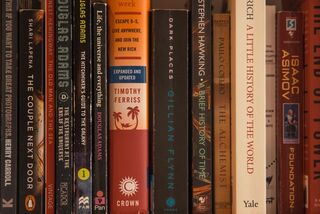Media
5 More Things You Need to Know to Become a Great Author
Part 2: A peek into educational book publishing.
Posted May 20, 2020

Part 1 of this post used The Cat in the Hat overthrowing Dick and Jane to introduce the idea that a book can do great things for the education field. While Dr. Seuss wrote fiction, education stakeholders have much knowledge to impart through more serious books. I am often asked by aspiring nonfiction writers about what they should know before beginning their own journeys to authorship.
Following is an excerpt from an interview I did with Yitzi Weiner of Authority Magazine that addresses this topic. Part 1 of this post addressed challenges, stories, habits, and inspiration. Part 2 includes what the interview’s title promises: “5 Things You Need to Know to Become a Great Author” (below). Anything that could be deemed self-promotion has been removed from the excerpts so all that remains is my advice for aspiring authors.
Based on your experience, what are the “5 Things You Need to Know to Become a Great Author”? Please share a story or example for each.
Write, read, and revise while standing in your audience’s shoes: Once we writers lay down a sentence and feel we’ve relayed a concept, it can be hard to look at our words with fresh eyes and stand in the shoes of the reader. But failing to try to read from our primary audience’s perspective can cause us to miss huge holes in our writing that could have been easily filled. For example, once I read an article on writing an effective proposal, and it wasn’t until six paragraphs in that I could guess the author meant a business proposal. However, nowhere in the entire piece was the phrase “business proposal” ever used. The meaning of “proposal” could have alternately meant an op-ed proposal to a problem, a book proposal, a grant proposal, a marriage proposal, or something else. If the author had stood in his or her reader’s shoes and remembered, “Hmm, I’m new to this piece. What is this about? What does the writer mean?” he or she would have realized the article required more clarification.
Share a clear message in your work and your branding: Many people think Malala Yousafzai, the youngest Nobel Prize winner in history, became the face of every girl's right to an education because she was shot in the face by the Taliban for daring to attend school as a girl. But Yousafzai was already an adept promoter of this message before she was shot. For example, she already had her own column blogging for the BBC at age 11, four years before she was shot, and she had already won a national peace prize and Desmond Tutu had nominated her for the International Children's Peace Prize. In all her endeavors, Malala propelled the same message: that every child has the right to an education, regardless of gender or anything else. Making a clear, singular message shine in your communications prevents your key point from being lost, helps you to be known as the authority on that subject, helps people accept your message, and helps people publish and buy your books. Once you are an established author it will be easier to write about a multitude of issues, if you desire, because by then you won’t have to worry about maximizing every chance to be remembered.
Maintain a press/media webpage: Journalists look for these pages to find information they need, but they also look for these pages as an indication you are quote-worthy and used to working with the media. Seeing a list of previous press experience on a reporter-friendly press page will help assure them of this. The attention of reporters means more exposure and thus more people reading your books. Visit www.jennyrankin.com/press for a press page example. Add a link to your press page to your email signature and to your correspondence with journalists. Also make your media appearances obvious on that webpage. Once I landed on NPR and made it obvious on my press page, other soundbites and interviews rolled in quickly: NBC News, HuffPost, O: The Oprah Magazine, Newsweek, Good Housekeeping, The Washington Post, U.S. News & World Report, Reader’s Digest, and many more. I believe none of my appearances in these outlets would have happened without my press page. If you have little or no media exposure to add to your press page, register with the free directory Public Insight Network (PIN), which is used extensively by TV stations and networks (like PBS), public radio (like NPR), news organizations (like The Washington Post), and universities to find experts to book on television, on radio, for articles, etc.
Maintain a strong social media presence: Publishing houses are businesses, and they want to know that you and your image will help sell your book. An established media presence is crucial to exposure, partly because it connects you with the media and so many other chances for exposure. According to a Pew Research Center (2018) survey, 71% of Americans use social media to get news, connect with one another, and share information. Contrary to popular belief that Millennials dominate social sites, Generation X (ages 35-49) spends the most time on social media (nearly 7 hours per week), and the average time for all adults is over five hours per week spent on social media. Your presence on Facebook (still a leader for older age groups), Instagram (the fastest growing social media tool for every age group), LinkedIn (crucial to establishing professional credibility), and Twitter (the most popular for journalists and researchers, and also a tool known for the kind of commentary in which authors partake) is especially crucial. Consider how I landed the chance to lecture at University of Cambridge (an honor that lent me major credibility as an author since it's one of the world's top universities): I saw a Twitter post about the position, and that post linked to the class’s Facebook page, where I found a link to the university’s application instructions. If you aren't engaging in regular dialogue on social media, you are missing a vital chance to be established as the kind of go-to expert people will want to read books from, and you are missing the many book promotion opportunities to which social media will lead you.
Bring something new to the table: Every book proposal will ask you to make the case that, in some way, your book is not just like something else already out there. You might have the same style as another book or the same subject matter or some other similarity, but you should offer a different spin on things. Otherwise you’ll be sharing the market with those other books just like yours. Being different will also help your book stand out and be noticed. Think of every tennis player you can. You might recall Billie Jean King and Arthur Ashe, who broke barriers; Andre Agassi, who sported a heavy metal mullet and wore acid-washed jean shorts on the court; Serena and Venus Williams, who wear bold fashions and sometimes purple hair; Anna Kournikova, who starred in her then-boyfriend Enrique Iglesias’ music video; and John McEnroe with his infamous tantrums. But most of those are not even considered the world’s greatest tennis players of all time. Those I named are/were great players, but it was their unforgettable image (forged by breaking barriers, personality, style, or other markers unrelated to their skill on the tennis court) that pushed them over the edge into being 100% memorable. Likewise, combined with being a great book, your writing should carry something new that readers will remember and tell others about.
Reprinted with permission from Authority Magazine.
References
Pew Research Center. (2018, March 2018). Social media use in 2018. Retrieved from www.pewinternet.org/2018/03/01/social-media-use-2018-appendix-a-detailed-table


